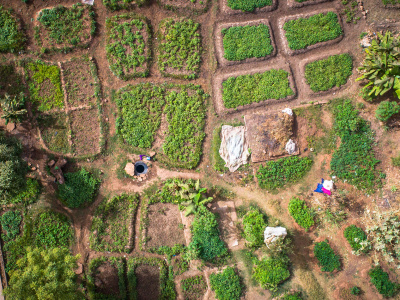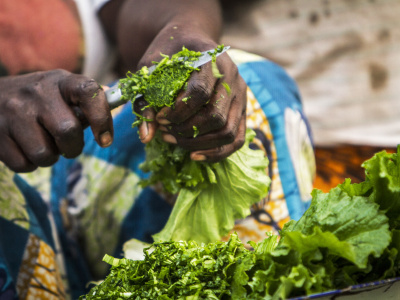
Power, politics and inclusion in food systems: The case of Sudan
There is an emerging consensus that our food systems need to change to provide healthier diets within planetary boundaries. There has been no shortage of potentially game-changing solutions proposed by the international community, but well-intended policies will fail if they don’t take into account power dynamics at a local level. Instead, they could push marginalised groups further into poverty, cause costly enforcement because they lack legitimacy, or block change because of vested interests.
We took Sudan as an example to illustrate why local policymakers should adopt a politically sensitive approach when designing and implementing food policies and how they can do so.
A food systems approach should guide increased efforts and investments in Sudanese economic recovery
Economic recovery, youth employment and climate resilience are high on Sudan’s political agenda. Food systems are central to all these different developmental outcomes, but they are not the first thing on the prime minister’s mind. Political survival, attracting foreign investment, aid and increasing fiscal space claim most of his agenda and attention.
The Sudanese government hopes that support by international partners will take off, now that it is implementing major economic reforms and the international community has slowly lifted sanctions. Sudan’s significant debt burden weighs heavily on its economic recovery. There are calls for debt reform to be linked to a green and inclusive recovery. This means that governments that will receive debt relief need to align their policies and budget reforms with the Sustainable Development Goals (SDGs) and the Paris Agreement. But will increased efforts and investments in the food economy – the main source of employment for young men and women in the country – benefit the Sudanese people?
Connecting food, climate and other issues is not enough
Sudan is a regional agricultural powerhouse. It is one of Africa’s main exporters of groundnuts and fava beans, and has the largest irrigated area in sub-Saharan Africa and the second largest in Africa, with rising exports of livestock and hides to the Middle East. Precisely because of the central role food and agriculture play in Sudan’s development, a food systems approach could help tackle the challenges of Sudan’s food security, climate, health and agricultural developments. A National Summit Dialogue, organised in April ahead of the UN Food Systems Summit, was an opportunity to do exactly this. A second one followed on 3 July which has yet to disseminate its findings.
But has the Sudanese National Summit Dialogue helped Sudanese stakeholders to agree on the need for a food system transformation and on how to reach that goal?
Certainly, the Dialogue led to a number of insights, for example on how subsidies need to be adapted to food system challenges and on the need for strong justice to achieve fair livelihoods. However, the call for technical and financial support suggests that there are still a lot of question marks around the how.
Framing problems and solutions differently can already increase the effectiveness and coherence of policy and investment decisions in food and agriculture. Changing mindsets in Sudan could mean, for example, that instead of thinking of informal parts of the food economy – like transport, small-scale processing and food vendors – as a problem, policymakers acknowledge their vital contribution to healthy diets and incomes for urban and rural households. Building on the strengths and priorities of street vendors, for example, small investments and targeted support can have a positive impact on the food safety of consumers and incomes of the (mostly female) vendors.
A more integrated and politically informed approach to food system transformation is needed
Policymakers and practitioners need a systematic way of thinking to design and implement policies that are conducive to sustainable development – in Sudan and elsewhere. This is easier said than done, as the complexity of food systems can be overwhelming. That is why ECDPM has put together a guide to help navigate this complexity (and so did others, like Wageningen University & Research and the UN Food and Agriculture Organization and INRAE).
Policymakers and politicians can be overly optimistic about the synergies that can lead to increased sustainability of food systems. For example, it is not only advantageous for the environment but also in the interest of private companies to invest in more sustainable agricultural practices to ensure the continuity of their sourcing. However, in practice, efforts to improve environmental sustainability – for example certifying ‘deforestation-free’ palm oil – may push small-scale producers who don’t have the means for certification out of the supply chain.
Managing these trade-offs is a political game. This recent OECD report on ‘Making better policies for food systems’ finds that friction over facts, interests and values are major obstacles to achieving policy coherence. Interests and incentives can clash and ideas that guide decisions can differ greatly. The inconvenient truth is that transforming food systems requires some to change course and that those who think they will be negatively affected by policy reform will do their best to block change.
A political economy angle in food system approaches can help to understand interests and incentives that can push the food system towards socio-economic or environmental sustainability and the actors that are likely to block changes in the system. In Sudan, for example, strong vested interests in gum arabic trade – an essential ingredient in a wide range of items, including food stuffs like sodas and ice cream – make it difficult for investments in the value chain to trickle down to the poor farmers who harvest the product. After years of conflict, of which the government was part, local communities have trouble trusting that decision-making processes around access to water resources for instance are transparent and inclusive.
Innovative approaches to increase trust and accountability between food system actors will be key if development partners and Sudanese policymakers want debt relief and climate finance to contribute to Sudan’s green and inclusive recovery.
On the ground: conflict-sensitive approaches and multi-stakeholder dialogues
But how best to grow trust and accountability in Sudan? Two practical approaches from peacebuilding and multi-stakeholder dialogues can offer guidance to politicians and policymakers.
Peacebuilding organisations have developed mediation or political accommodation approaches to navigate conflicting interests in low-trust and fragile contexts, which can provide helpful lessons. Multi-stakeholder dialogues are a useful way to set common goals and help build consensus on the necessary steps to get there, based on shared values. Sometimes, however, differences in values are hard to overcome, and policymakers need to find solutions that people with different values can support.
It will surely mean incremental steps, where slowly building trust between the different stakeholders is at the core of the process, acknowledging that these are long-term processes which need political commitment and resources.
Without talking power, sustainable food systems will remain out of reach. Brokering and facilitating honest dialogues between different stakeholders can help bring in a diversity of perspectives and start the conversation on joint solutions.
There are also risks. These revolve around tokenism, lack of accountability and perpetuating existing power asymmetries. Multi-stakeholder dialogues should not be a one-off. They need adequate financial and human resources, and clarity on roles and responsibilities and on how different parties can be held accountable to their commitments. A diversity of views is crucial to challenge blind spots and assumptions and to avoid specific interest groups taking over the process. A first and seemingly straightforward step when designing a multi-stakeholder dialogue is to ask who is not at the table – and why.
The National Summit Dialogues themselves are meant to provide an open platform for all stakeholder groups to discuss ways to improve or transform food systems and ways to get there. Without addressing politics, power and inclusion in food systems in Sudan, policy reforms and (foreign) investments in food systems risk deepening existing inequalities and worsen current food system challenges, instead of reviving a green and inclusive economy.
The views are those of the author and not necessarily those of ECDPM. The author is grateful to Mai T. Amir, former Sudan Program Director for Conflict Dynamics International, for providing insights on the Sudanese context and to Niels Keijzer and Sean Woolfrey for feedback and comments.
Photo courtesy of Alfio Casella.




